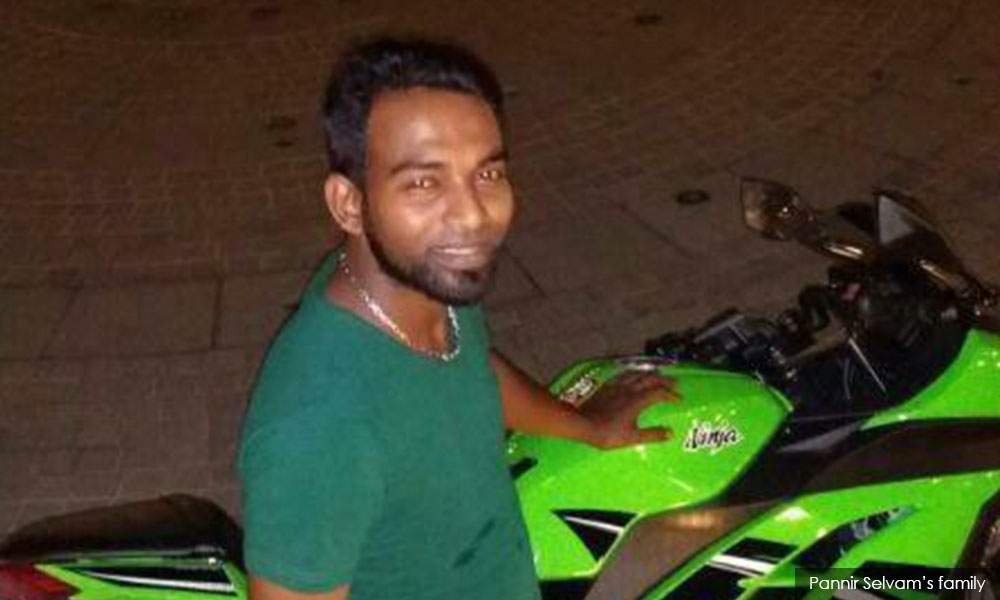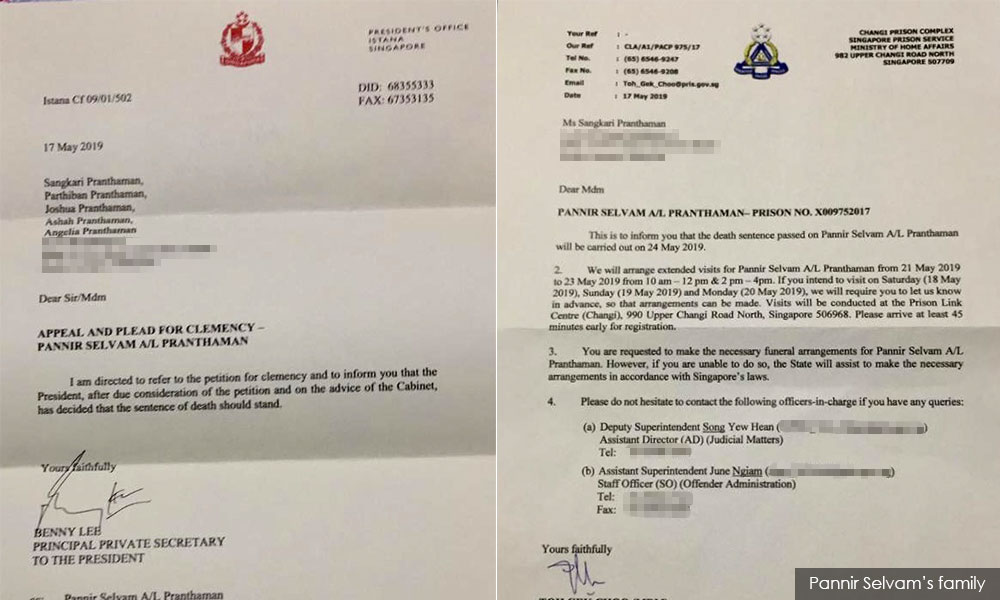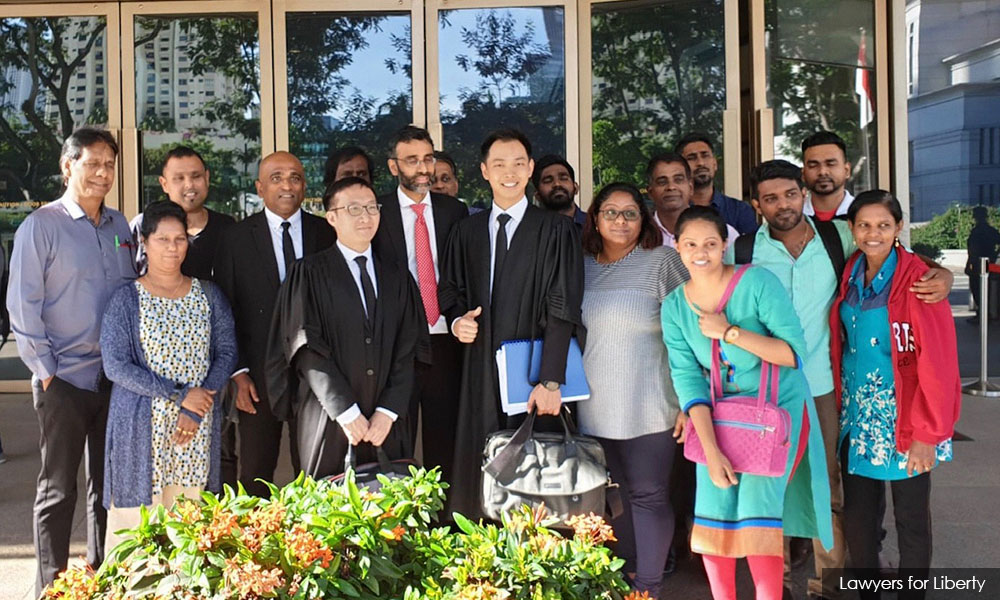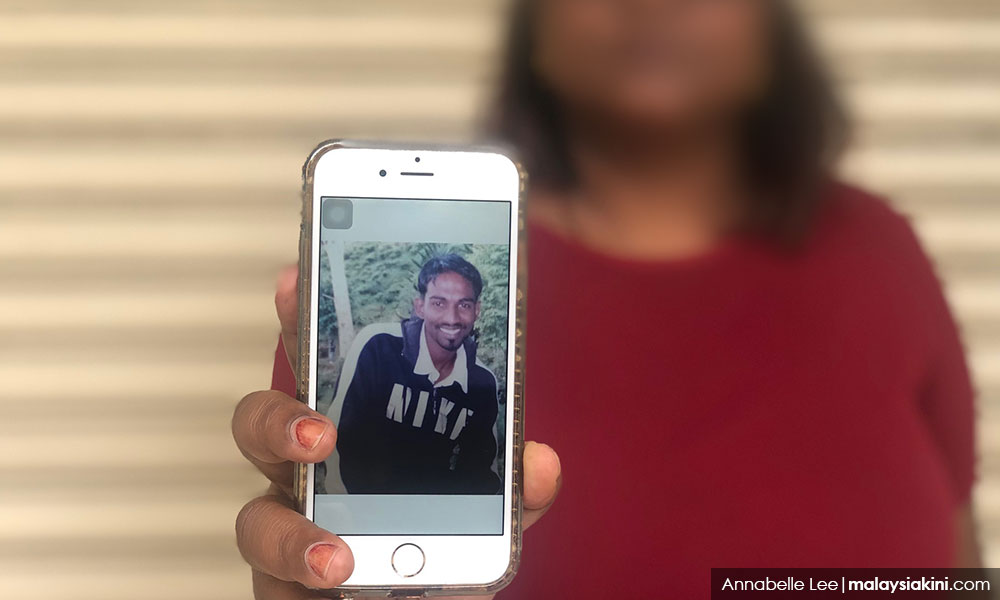
SPECIAL REPORT | P Sangkari was picking up groceries when she received an unexpected phone call from the Singapore Prison Service.
They told her she had mail, and she immediately rushed home.
The large couriered package contained two letters about her brother P Pannir Selvam, who was interned in Changi Prison, on death row.
One letter said that his clemency petition had been turned down by Singapore President Halimah Yacob. The other was a notice from the prison that he would hang in a week - on May 24.
The family was asked to make funeral arrangements.
Sangkari’s hands shook as she took in every printed word. Her shock quickly turned into puzzlement when she noticed both letters were dated May 17, the same day they arrived in her mailbox.
The date on the courier package indicated it had been posted a day before, on May 16.

Had the letters been post-dated? Why were they sent together? Why was the family given just one week notice of the execution? Was this common procedure? Sangkari was bursting with questions.
“It was as if they were rushing to hang someone, and it happened to be Pannir.
“Were they rushing to hang someone because they didn’t want to waste a Friday? The hangings usually happen on Fridays.
“We did not even have enough time to consult lawyers to challenge the clemency process or ask if anything else could be done,” she recalled in a recent interview in Petaling Jaya.
Changi Prison later told Sangkari that this was all normal procedure, but she said they could not provide her with any written proof.
There is no prescribed process for clemency rejections or execution notices under Singapore law.
Arrested for carrying heroin
According to the latest statistics Wisma Putra shared with Malaysiakini, Pannir is one of 14 Malaysians on death row in Singapore. All are for drug trafficking charges.
Back in 2014, 27-year-old Pannir was living and working as a security guard in Singapore when he was arrested at the Woodlands Checkpoint for carrying 51.84gm of diamorphine (heroin).
He was convicted and sentenced three years later.
Pannir appealed, maintaining he had been duped into carrying the illegal substance and was merely a drug mule, but he was unsuccessful.
At that point, Sangkari estimated that the family had spent SG$10,000 (approximately RM30,000) on legal fees alone.
However, when clemency was rejected and execution was imminent, they scrambled for ideas as Pannir did not have a lawyer.
And suddenly, he did.
Ten minutes before Pannir’s clemency rejection hearing on May 23, the day before his scheduled hanging, two lawyers introduced themselves to the family and their Malaysian advocate, N Surendran, outside the courtroom.
The duo - Too Xing Ji and Lee Ji En - had learned about the case from their peers and decided to offer their help pro bono (without charge).
They argued that Pannir’s seven-day notice was insufficient for him to seek legal advice, and the Singapore Court of Appeal granted a stay on the execution.
“Because circumstances were such for us, we were prepared for the worst.
“They (the lawyers) appeared out of nowhere, I don’t know, I feel like God sent them.
“I am really thankful to them... they came at the time when we most needed help,” Sangkari said when describing how the family responded to the court’s decision.
The lawyers have since filed a judicial review challenging the clemency rejection process. They are awaiting a hearing date.
Legal aid NGO Lawyers for Liberty is also providing the family with legal assistance in Malaysia.

For Pannir’s family members, the past five years have revolved around him.
A family affair
Sangkari, who works full time, spends most weekends travelling from Kuala Lumpur to Changi Prison. Her eldest brother found a job on the island state so that he could visit Pannir more often.
Another brother deferred his university studies to focus on the case. Their youngest sister recently quit her job to work on a website about Pannir.
Back in 2018, they learned that Pannir’s death sentence could be commuted to life imprisonment should he provide Singapore’s Central Narcotics Bureau with enough information about drug activities to obtain a Certificate of Substantive Assistance.
Working with whatever little Pannir could remember, Sangkari had quickly assembled several family members to help uncover more about the case.
They pounded the pavements of Johor Bahru where Pannir had allegedly met the man who convinced him to carry “sex medicine”, which was eventually proven to be heroin, into Singapore.
After several false leads, they eventually obtained details - the full name, IC number, car registration number, even a photograph - of the alleged mastermind.
Sangkari handed the files to her brother for him to pass on to the Singaporean authorities.
The Singaporean police later responded saying Pannir had failed to obtain the certificate.
“They just said ‘sorry, your request was not granted’, something like that, in just one line.
“Was the information not sufficient? If it was not sufficient, what other information did they require?
“There was no checklist, nothing. Basically, we were not aware of what their requirements were. Maybe we didn’t meet them, but how do we meet them when we don’t even know what the requirements are?” Sangkari said during the interview.
Aside from challenging the clemency rejection process, Pannir’s lawyers are also disputing his failure to be given a Certificate of Substantive Assistance through a judicial review.

Growing up in Ipoh as a Christian pastor’s son, Sangkari said Pannir was cheeky, athletic and often played the drums at church services.
Second chances
As an angsty teenager, he travelled down south to Singapore after completing high school to find work and a sense of self.
Living away from home, Sangkari said her brother worked hard but began to gamble. She believes Pannir was eager for friendship when he agreed to transport "sex medicine" for the alleged mastermind despite only knowing him for three weeks.
These days, she calls her brother, now 31, a changed man who is on a mission to warn Malaysian youths to stay away from drugs.
More specifically, Pannir wants to raise awareness about how drug masterminds work so that fewer people will end up as drug mules like him.
For Sangkari, penalising drug couriers like Pannir does little to cripple sophisticated drug networks.
“Hanging the drug mules or the couriers will never stop the crime... if they really want to get rid of this drug pushing, they should find the root cause and try to catch the masterminds.
“Maybe the Singapore government can still punish Pannir but not by hanging him or executing him.
“Yes he made a mistake, but he shouldn’t pay with his life for that,” she pleaded.
This interview was jointly conducted with The Malay Mail.


No comments:
Post a Comment
Note: Only a member of this blog may post a comment.